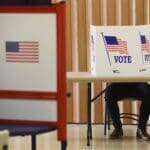More than 48,600 18-year-olds are registered to vote in Ohio, a 35% increase from late August
Ohio has seen a recent spike in young voter registration.

Ohio has seen a recent spike in young voter registration.
More than 48,600 18-year-olds are registered to vote in Ohio as of Jan. 6 — a 35% increase compared to late August, according to data analyzed by the Civics Center, a nonpartisan organization trying to increase voter registration.
“What we typically see is that registration rates, especially for the youngest voters, can go up very significantly when young people become more aware of elections in which their votes will matter,” said Laura Brill, founder and CEO of Civics Center.
2024 is going to be a big election year between the presidential election, Ohio’s U.S. Senate race, a potential anti-gerrrymandering amendment proposal, three Ohio Supreme Court races, and the Ohio House of Representatives elections. Oct. 7 is the deadline to register to vote for the Nov. 5 general election. Early voting for the March 19 primary started Wednesday and the deadline to register to vote was Tuesday.
“When young people are registered, they tend to turn out at high rates when they know that their votes will make a difference,” Brill said. “I think a lot of it depends on whether the candidates and parties are really getting the word out to young people about what’s at stake.”
Ohio’s November 2023 election enshrined abortion rights in the state constitution and legalized recreational marijuana.
“There were multiple, very high profile elections going on in Ohio,” Brill said. “It provided a concentrated deadline for people to focus on to get registered.”
However, there is still a long way to go with getting young people registered to vote. More than 100,000 18-year-olds in Ohio remained unregistered to vote as of January, according to the Civics Center.
Buckeyes For Voting Rights
Ohio State University senior Cassie Mohr helped launch Buckeyes For Voting Rights, a nonpartisan organization that helps students register to vote.
“We just want every student at Ohio State that’s eligible to vote … to be able to cast their ballot comfortably and easily,” said Mohr, who is studying political science and public affairs.
She first started helping people register to vote back when she was a senior at Westerville North High School, just north of Columbus.
“I realized that a lot of students, a lot of 17-18 year olds, want to register to vote, but they don’t register to vote if nobody presents them with the opportunity,” Mohr said. “If nobody helps guide them through the process and helps them fill out the form and everything, then it’s something that people forget about.”
Nearly 90% of Ohio State students were registered to vote for the 2020 presidential election and 75% of students voted in that election, according to the Institute for Democracy and Higher Education.
“The hope is since voting is a habitual process, that we can get them engaged to talk about what issues matter to them,” Mohr said. “And then once we can get them engaged, then hopefully we can make them a lifelong voter.”
Ohio’s photo ID law
A law went into effect last year that makes it harder for out-of-state college students to vote in Ohio.
Under the new law, Ohioans must show a photo ID in order to vote, meaning an unexpired Ohio driver’s license, a state ID card, U.S. passport or military card. A college or university ID does not count as a photo ID.
Out-of-state college students who want to vote in Ohio must get a state issued ID card, but that invalidates their driver’s license in another state.
Because of this, Mohr is concerned it will prevent some people from being able to vote — especially since Ohio State has more than 12,000 out-of-state students.
“I think that it’s going to put a huge strain on county board of elections offices,” she said. “This photo ID law is going to create a lot of chaos in November.”
Arkansas, Georgia, Indiana, Kansas, Mississippi, Missouri, North Carolina, Ohio, Tennessee, and Wisconsin are all strict photo ID states, according to the National Conference of State Legislatures.
This story was originally published in the Ohio Capital Journal
Recommended

Biden campaign launches new ad focused on Affordable Care Act
Former President Trump has said he wants to do away with the popular health care law.
By Kim Lyons, Pennsylvania Capital-Star - May 08, 2024
Democrats regain full control of state House with two special election wins
In special elections on Tuesday, state House Democratic candidates Peter Herzberg and Mai Xiong scored victories in two Southeast Michigan districts to help secure a 56-54 voting majority for their caucus.
By Ken Coleman, Michigan Advance - April 17, 2024
Youngkin blocks Democratic bills dealing with elections
Vetoes affect ranked choice voting and voting rights lawsuits
By Graham Moomaw, Virginia Mercury - April 11, 2024







































































